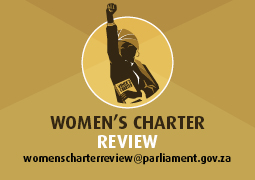
The ongoing parliamentary review of the Women’s Charter continued this week with a virtual session to discuss the impact of the gender pay gap in advancing gender equality. The process is jointly led by the Deputy Chairperson of the National Council of Provinces (NCOP), Ms Sylvia Lucas, and the Deputy Speaker of the National Assembly, Mr Lechesa Tsenoli.
In her opening remarks, Ms Lucas said the Women’s Charter Sector Review session forms part of the review processes of the entire women’s rights regime. Its objectives include Parliament holding the spheres of government accountable on implementing gender transformation and leadership to ensure gender equality. Another objective is to fast-track programmes with clear indicators and based-line data, to facilitate the monitoring of gender wage inequality.
“Within the context of the 25-year review of the Women’s Charter,” Ms Lucas said, “we must also assess the number of women represented in decision-making positions in both the private and public sectors. We must also deliberate on interventions we can put in place to address remaining inequalities.”
She also reported that the review process will culminate in the production of a live document to articulate policy interventions, law-reform processes and improved systematic arrangements to improve the status of women in South Africa. “Through this process we seek to crystallise our focus and give guidance to apex priorities, which must underpin the attainment of gender equality.”
Statistician-General Mr Risenga Maluleke told the session that the numbers confirmed that there was a gap in remuneration between men and women. “Women emancipation is a necessity in order to address gender wage inequality. In every aspect of life, women are always in an adverse situation, be it at work or otherwise.”
However, there is progress in the lowest levels of employment, where women were remunerated equally to men. At executive level, however, “women are not remunerated equally to men”.
He said statistics showed that education played an important role in the emancipation of women and there is evidence that women with tertiary education are moving up the structures and catching up with males. “There are some improvements but not much to reaching parity”, said the Statistician-General.
The Chairperson of Parliament’s Multiparty Women’s Caucus, Ms Nkhensani Bilankulu, said gender pay parity statistics need further discussion in government.
Also taking part in the session were representatives from the Commission of Gender Equality (CGE), the Public Service Commission (PSC), the National Economic Development and Labour (Nedlac), the Black Management Forum, and academics from the University of Stellenbosch.
Dr Nthabiseng Moleko, the Deputy Chairperson of the CGE, suggested that women’s economic empowerment be clearly articulated through ministries’ public policy documents, such as the departments of Trade and Industry, and Small Business Development. She argued that one of the challenges is that programme objectives are not clearly articulated or linked to the broader strategic policy goals of government’s policy on women’s economic empowerment.
Commissioner at the PSC Ms Phumelele Nzimande said the public service is still lagging behind in ensuring women representivity. “Public service offers a transparent and equitable remuneration system to its employees, regardless of gender. However, there are more male employees at senior management service levels in the public service, in spite of the fact that there are more women in the public service. There is a need for concerted effort to address the underrepresentation of female employees, especially at the senior management service levels.”
Success in gender power relations should be led by exemplary government practices, Ms Nzimande added. “It is however admirable for Parliament to take the lead in reviewing the Women Charter to give impetus to this societal challenge. Mindful that no one sector of society can do this alone.”
Sakhile Mokoena
16 July 2020

